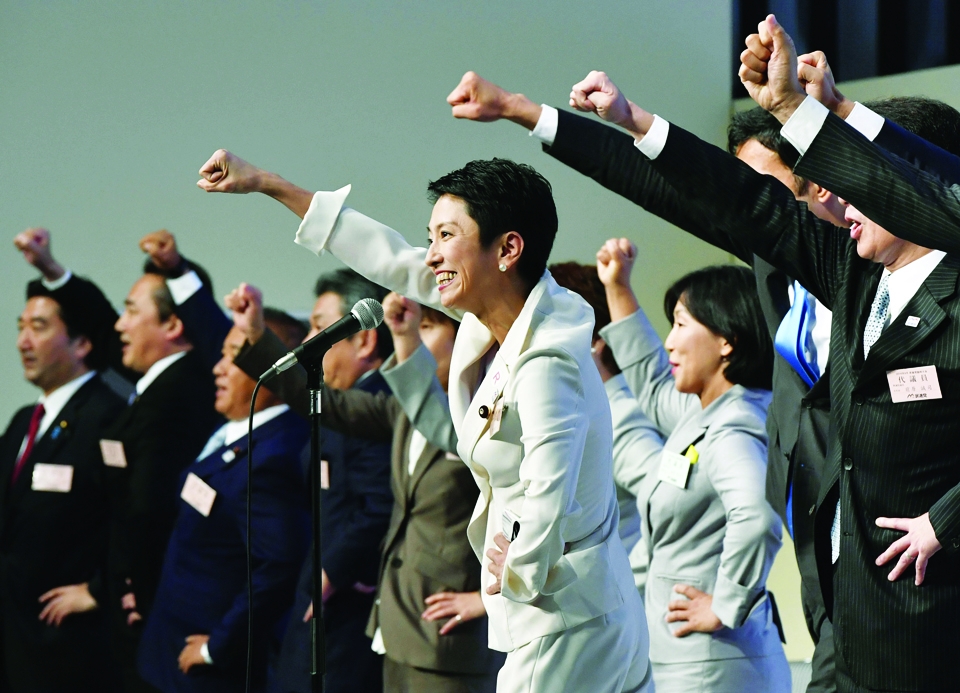

By: Ollie Gratzinger | Staff Columnist
Renho Murata has been a news anchor, a swimsuit model and a journalist.
But as of last week, she became the first female leader of Japan’s largest opposition party.
Not only is she the first female to front the Democratic Party of Japan, but she’s also the first person with mixed ethnic heritage (being both Taiwanese and Japanese) and a foreign citizenship (a Taiwanese national) to head a major political party in the country.
Despite the fact that women are still vastly underrepresented in the Japanese parliament, Murata is the third to be elected in two months, joining Yuriko Koike and Tomomi Inada in the world of national politics. According to an article in The Guardian, Koike, the new governor of Tokyo, has already made progressive bounds by postponing the relocation of Tokyo’s biggest fish market due to contamination concerns. The same article hints that Inada, Japan’s newest defense minister, could become the country’s prime minister sooner rather than later.
This all comes off as great progress, especially when we consider the fact that it wasn’t until 1965 that all women in the United States were granted the right to vote.
While textbooks and high school history classes often assert that 1920 was the pivotal year, the fact remains that it wasn’t until the Voting Rights Act, passed on August 6, 1965, that racial minorities could exercise their same judicial rights at the ballot box as their Caucasian counterparts.
That makes almost exactly 51 years. Such a number might seem large at first glance, especially in the scope of the 18, 19 or 20-something years we’ve got tucked away behind us.
To put things into perspective, a Google search of historical events has shown that we’ve had color television and (primitive) computers since the late 1940s. The first video game, a simplified version of “Pong,” was created in 1958. With that being said, consider this: Some of today’s favorite luxury items are older than a woman’s right to vote.
But now, it’s 2016. The year has brought with it storms and sunshine alike, crafting progress and setbacks and just about everything in between. If there’s one thing that’s grown up more than anything else over the course of the year, it’s the idea of women in politics.
The effects of feminine excellence aren’t necessarily as far away as Japan. Here in the United States, with Hillary Clinton as the Democratic nominee and presidential hopeful, women are taking strides toward equality and inclusion in spheres typically dominated by men.
Students around campus are just as concerned with and inspired by the growing female involvement in politics.
“I think it shows progression, especially in countries outside of the United States,” said freshman Juliet Arowosaye when asked how she felt about women like Renho in high political offices around the world. “This is very good news to me. Makes me really happy. This should be the norm. It shouldn’t be a big deal, and I hope we eventually get to the point where it’s not a big deal that we have a woman in office. I think it’s very important to move away from the paradigm of only rich white men — or just rich men, if we’re talking about other countries — being in charge.”
Freshman Hope Sloop had a similar response to the same question.
“I believe it is imperative that women are present in high political positions,” Sloop said. “We as women are still making [less than] men make, and nothing good can come from having men dominate the seats that could actually bring about change. Although I don’t exactly love Hillary Clinton, I do think that it is time for a woman to be president, and that she would not be the worst option in the world, or even in the country (i.e. Donald Trump).”
With a barrage of terrifyingly powerful men out there — Trump included — it’s both refreshing and exciting to see the influence that these women are having on young people. The power of representation is nothing short of amazing. A little girl who sees only men doing great things might begin to wonder whether or not she, too, is capable of greatness. Show her women such as Murata embodying greatness with a mixed ethnic background and foreign citizenship, and the same little girl might come to realize that not even the sky itself can limit her.
Diversity is beautiful in an ethereal kind of way. Thwere have been periods throughout history in which mankind feared it, challenged it and fought it. We’ve reached a point, though, at which steps are being taken to appreciate all faces of the world, embracing racial, ethnic, religious and gender differences.
To Murata, Koike, Tomomi and Clinton alike, I say it’s about time.




